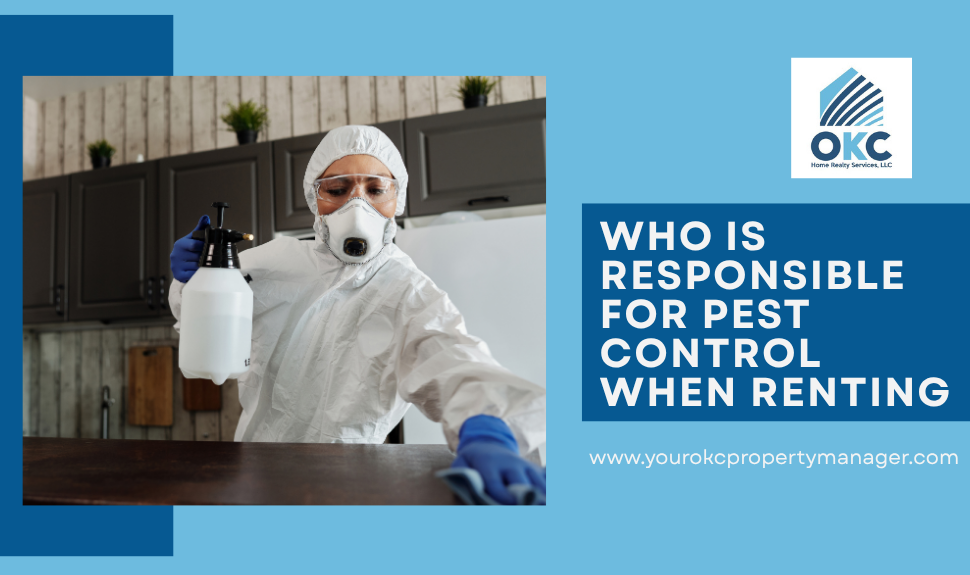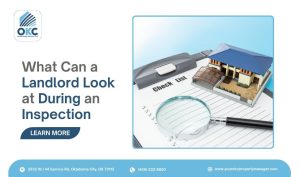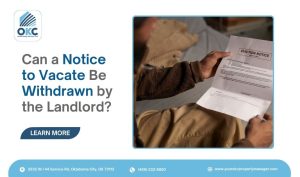You hand over the keys to your new tenants, everything looks spotless, and then, a week later, you get a call: there are cockroaches in the kitchen. It’s one of the most uncomfortable areas in property management: who’s responsible for pest control when renting? Is it the landlord’s duty, or should the tenant handle it?
As a property manager with over 15 years of experience, I can tell you this issue touches legal obligations, lease terms, tenant relations, and even your property’s long-term value. Pests, whether it’s roaches, mice, bed bugs, or termites, can damage structures, spread diseases, and drive tenants away faster than a rent hike.
This guide breaks down everything you need to know legally, practically, and strategically about landlord pest control so you can keep yourself free from complaints about pest control.
Pest law in Oklahoma: What landlords need to know
If you own rental property in Oklahoma City, understanding your legal responsibility for pest control isn’t just good practice; it’s essential for compliance, tenant satisfaction, and protecting your investment. Many landlords assume that once a tenant moves in, pest problems become “their issue.” But under Oklahoma’s rental laws, that’s not always true. Let’s break it down in simple, landlord-friendly terms.
1. OKC-County Health Department Rules
The Oklahoma City–County Health Department (OCCHD) has guidelines about who’s responsible for pest control depending on property type:
- For multifamily housing: The landlord or property owner is responsible for pest control and must ensure infestations are eliminated quickly.
- For single-family homes or duplexes: The tenant is generally responsible for regular pest prevention unless the infestation stems from property conditions or was present before move-in.
So, if you manage an apartment complex or duplex in OKC, you can’t simply write “tenant handles all pest control” in your lease and walk away. Local health rules may override that clause if they place the burden on the property owner.
2. The “First 30 Days” common clause in Oklahoma Leases
If you’ve reviewed standard Oklahoma residential lease templates, you’ve probably seen a common clause that says:
“Landlord shall be responsible for eradicating any pest infestation reported by Tenant within the first thirty (30) days of possession. Any infestation reported after that period shall be the tenant’s responsibility, unless due to structural or plumbing issues.”
The first 30-day rule is a common lease clause used in Oklahoma City. It creates a fair balance, ensuring the tenant receives a pest-free home at move-in, while placing responsibility for future infestations (caused by poor hygiene or negligence) on the tenant.
3. The Implied Warranty of Habitability
Every residential lease in Oklahoma, whether written or verbal, carries what’s known as an “implied warranty of habitability.” That means as a landlord, you’re legally required to provide your tenants with a home that’s safe, sanitary, and livable.
If your property has cockroaches in the kitchen, mice in the walls, bed bugs in the bedroom, or termites in the foundation, it may be considered uninhabitable until those issues are fixed. Even though Oklahoma law doesn’t list “pests” word-for-word in every statute, the courts have repeatedly interpreted infestations as violations of the landlord’s duty to maintain a habitable property.
In other words: you must deliver the unit pest-free — and handle pest issues that result from structural defects, leaks, or pre-existing infestations.
Who is responsible for pest control when renting?
In Oklahoma City, responsibility depends on the timing, cause, and type of infestation, as well as what’s clearly written in your lease agreement. Let’s break this down so you can handle it confidently:
Landlord’s Responsibility: Keeping the Property Habitable
As a landlord, your main legal duty is to deliver and maintain a habitable home. That means your property must be clean, structurally sound, and free from pests when tenants move in.
This is where your implied warranty of habitability comes into play, ensuring landlords maintain safe living conditions and address issues like plumbing leaks, unsafe wiring or mold in rental apartment.
Here’s when pest control usually falls on you:
- Pests were present before the tenant moved in.
- Infestation is caused by structural issues, such as cracks, leaks, or poor sealing.
- Pests are spreading between units in a multifamily property (apartments, duplexes, or townhomes).
- Health codes or city regulations require you to provide pest control (like in multifamily buildings).
- The lease agreement clearly states pest control is included as part of property maintenance.
Example:
If a tenant moves into your rental and reports roaches within the first week, it’s typically your job to handle extermination, since it’s unlikely the infestation developed that quickly.
Tenant’s Responsibility: Keeping the Property Pest-Free
Tenants aren’t completely off the hook, though. Once they move in, they have to maintain basic cleanliness and hygiene to prevent infestations. Oklahoma law expects tenants to “keep their unit as clean and safe as conditions permit.”
Here’s when pest control becomes the tenant’s responsibility:
- Poor housekeeping leads to pest problems (e.g., dirty dishes, uncovered food, trash buildup).
- Pests appear long after move-in and aren’t linked to property defects.
- Tenant refuses or delays allowing exterminators entry.
- Pet fleas or bed bugs were introduced by the tenant or their guests.
Example:
If a tenant leaves food out or forgets to take out the trash, and that attracts ants or mice, it’s generally their problem, not yours.
Shared Responsibility
Sometimes, it’s not crystal clear who’s at fault, especially with pests like bed bugs or termites that can spread slowly or come from neighboring units.
In those situations, shared responsibility often makes the most sense. Many OKC landlords take a “cooperative approach” for pest control in rental properties:
- The landlord pays for the inspection or first treatment.
- The tenant follows all instructions (laundering, cleaning, prepping).
- Both agree to communicate openly and document everything.
This approach not only keeps the property pest-free but also builds trust and avoids conflict.
What to do when a tenant reports a pest problem?
Pest problems in rental property are common, especially in older buildings or humid months, but how you respond makes all the difference. A calm, timely, and documented response not only keeps tenants happy but also protects you legally.
Here’s a proven step-by-step plan to handle pest reports like a professional.
Step 1: Acknowledge and Respond Promptly
When a tenant reports a pest issue, speed matters.
Even if you can’t fix it immediately, acknowledge the problem right away, preferably in writing. This shows professionalism and helps establish a record of communication.
Step 2: Schedule a Professional Pest Inspection
Don’t guess; get the property inspected by a licensed pest control expert.
A professional can determine:
- The type of pest (cockroaches, ants, termites, bed bugs, etc.)
- The probable source (structural issue vs. tenant lifestyle)
- The extent of the infestation (isolated or spreading)
Having a report from a certified technician strengthens your case if there’s ever a disagreement over who’s responsible.
Step 3: Determine Responsibility (Landlord vs. Tenant)
Once you have the inspection results, decide who’s responsible.
If it’s the landlord’s responsibility:
- Schedule and pay for treatment immediately.
- Inform the tenant of the date/time and required prep steps (e.g., clearing counters, removing bedding).
- Follow up after treatment to ensure the problem is resolved.
If it’s the tenant’s responsibility:
- Share the inspection report explaining the findings.
- Remind them of lease obligations regarding cleanliness and pest prevention.
- Allow a reasonable timeframe for them to resolve it, and document everything.
Step 4: Take Preventive Action (Regardless of Fault)
Even if it’s technically the tenant’s fault, pest infestations can spread — and you don’t want them reaching neighboring units or causing long-term damage.
Always take preventive steps such as:
- Sealing cracks and entry points.
- Fixing leaks or moisture problems.
- Scheduling follow-up inspections every 3–6 months.
- Offering tenants pest prevention tips in your welcome packet.
Being proactive reduces future complaints and protects your property’s condition (and value).
Step 5: Document Everything
Documentation is your best defense. Keep written records of:
- The tenant’s initial report (email or text).
- Your response time and inspection appointment.
- Pest control invoices and technician reports.
- Follow-up communication confirming resolution.
If a tenant later claims you didn’t address the issue, you’ll have proof that you acted promptly and professionally, a big plus if the matter escalates legally.
Step 6: Communicate Clearly and Respectfully
Tenants can become anxious or even embarrassed about pest issues. A calm, professional tone goes a long way. Explain what’s being done, how long it’ll take, and what they can do to help.
Pest Control Options for OKC Landlords
| Pest Type | Best Treatment | Average Cost | Who’s Responsible |
| Cockroaches / Ants | Chemical / Eco Treatment | $100–$300 | Usually landlord (if structural) |
| Rodents | Mechanical / Chemical | $150–$400 | Shared |
| Termites | Barrier / Bait System | $800–$2,500 | Landlord |
| Bed Bugs | Heat + Chemical | $1,000–$2,500 | Depends on cause |
| General Prevention | Quarterly Treatment | $75–$200 | Landlord |
Final Thoughts: Rental Property Pest Control
At the end of the day, pest control isn’t just about keeping bugs out; it’s about protecting your investment, your tenants’ comfort, and your reputation as an OKC landlord. Whether the responsibility falls on you or your tenant, having clear communication, a well-written lease, and a preventive plan makes all the difference. Staying proactive not only keeps your property pest-free but also ensures compliance with Oklahoma’s rental housing and health regulations.
If you’re an Oklahoma City landlord who wants to simplify property maintenance and keep your rentals running smoothly, the team at OKC Home Realty Services is here to help. We specialize in full-service property management, so you can focus on growing your portfolio while we handle the details.
FAQs on Landlord Pest Management
Is pest control a landlords responsibility?
In most cases, yes, Oklahoma landlords are responsible for providing tenants with a safe, habitable, and pest-free property at the start of a lease. Under the Oklahoma Landlord and Tenant Act, landlords must ensure the home meets basic health and safety standards. If pests like roaches, termites, or bed bugs appear due to structural issues or poor maintenance, it’s typically the landlord’s duty to handle pest control.
Do landlord pay for pest control?
Generally, yes — but it depends on the situation. If pests are present before the tenant moves in, or the infestation is caused by property-related conditions (like foundation cracks or moisture issues), the landlord pays. However, if the issue arises due to tenant behavior, for example, leaving food out or failing to keep the unit clean, the tenant could be held responsible.
Does renters insurance covers pest?
No, most renters insurance policies do not cover pest infestations or the damage they cause. Insurance companies view pest problems as a maintenance issue rather than an accidental event. That means both tenants and landlords are expected to handle pest control proactively. However, landlords can protect themselves with routine inspections and pest prevention services to reduce costly infestations.
Is it the landlords responsibility to get rid of mice?
Yes, in most cases, the landlord must handle rodent infestations because they pose a health and safety risk.
What pests are most expensive to remove?
Some pests can be surprisingly costly to eliminate. Termites and bed bugs are at the top of the list. Termite treatment in Oklahoma City can range from $500 to over $3,000, depending on property size and damage.

Author
Scott Nachatilo is an investor, property manager and owner of OKC Home Realty Services – one of the best property management companies in Oklahoma City. His mission is to help landlords and real estate investors to manage their property in Oklahoma.
 (
(









